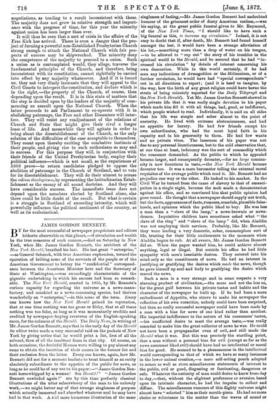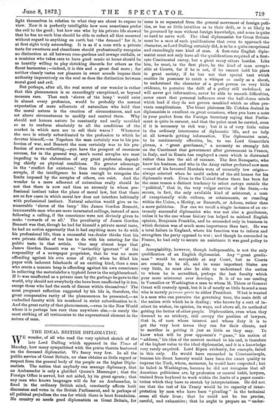JAMES GORDON BENNETT.
BY far the most successful of newspaper proprietors and editors hitherto observable on this planet,—if circulation and wealth be the true measures of such success,—died on Saturday in New York, when Mr. James Gordon Bennett, the architect of the New York Herald, breathed his last. His last great "enterprise," —as General Schenck, with true American euphemism, termed the operation of bribing some of the servants of the people or of the American Government to betray the " confidential " correspond- ence between the American Minister here and the Secretary of State at Washingtou,—was exceedingly characteristic of the gigantic undertaking in which his success had been so remark- able. The New York Herald, created in 1835, by Mr. Bennett's curious capacity for regarding the universe as a news-manu- factory, and mankind as a news-consuming species, had thriven wonderfully on " enterprise,"—in this sense of the term. Every one knows how the New York Herald gained its reputation, that at one time nothing was too gross or filthy, that at all times nothing was too false, so long as it was momentarily credible and credited by newspaper-buying creatures of the English-speaking races, for the columns of the Herald. The Daily News, in writing of Mr. James Gordon Bennett, says that in the early day of the Herald its editor twice made a very successful raid on the pockets of New York by giving notice that he would print a list, first of all the solvent, then of all the insolvent firms in that city. Of course, on both occasions, the doubtful Houses were willing to pay almost any sums to obtain the insertion of their names in the former list and their exclusion from the latter. Every one knows, again, how Mr. Bennett did not for a moment hesitate to treat himself as an entity absolutely subordinate to the appetite of the public for news, so long as he could be of any use to his paper:—" James Gordon Ben- nett horsewhipped by a woman! See Herald!" "James Gordon Bennett cowhided again !" are by this time perfectly classical illustrations of the utter subserviency of the man to his unlovely work,—we might better say of that strange singleness of purpose which actually immersed and absorbed whatever soul he may have had in that work. A still more humorous illustration of the same singleness of feeling,—Mr. James Gordon Bennett had undoubted humour of the grimmest order of dusty American realism,—was his saying, at the great public funeralgive.n to Mr. Raymond, of the New York Times, "I should like to have such a big funeral as this, to increase my circulation." Indeed, it is not easy to doubt that if, after death, Mr. Bennett had found himself amongst the lost, it would have been a strange alleviation of his lot,—something more than a drop of water on his tongue, —to be allowed to "rap out" the story of his troubles in the spiritual world to the Herald, and be assured that he had "in- -creased his circulation" by details of interest concerning his own damnation. While in this world certainly, if he had seen any indications of Armageddon or the Millennium, or of a further revelation, he would have had "special correspondents" out in all directions to report ; (and it is hard to imagine, by the way, how the birth of any great religion could have 'borne the strain of being minutely reported for the Daily Telegraph and the New York Herald). Yet Mr. James Gordon Bennett showed in his private life that it was really single devotion to his paper which made him fill it with all things, bad, good, or indifferent, which people wished to read. Individually, it is said on all sides that his life was simple and sober almost to the point of austerity. He lived with extreme abstemiousness, and had no appetite for luxury. He had few friends except his own subordinates, who had the most loyal faith in his capacity and in his generosity to them. He had few wants and no private vices. The looseness of his paper was not due to any personal licentiousness, but to the cold observation that, at one time at least, indecency was the sort of commodity which the consumer demanded. As the public to which he appealed became larger, and consequently decenter,—for no large commu- nity is now licentious in taste,—the New York Herald became decenter too. It was a mere barometer telling the external moral requisites of the average public which read it. Mr. Bennett had no prejudice one way or the other. He looked to his market. In the Civil War he turned from the cause of slavery to that of emanci- pation in a single night, because the mob made a demonstration against his office, and so convinced him that public opinion had gone round. He thought that a newspaper should supply not truth, but the facts, appearances of facts, rumours, scandals, plausible false- hoods, and opinions which the public liked to buy. He was less a man than a "slave of the lamp," a news-brownie or news- demon. Inquisitive children have sometimes asked what "the slave of the ring" and "slave of the lamp" did, when Aladdin was not employing their services. Probably, like Mr. Bennett, they were leading a very domestic, sober, commonplace sort of life, trusting for their little excitements to the moments when Aladdin begun to rub. At all events, Mr. James Gordon Bennett did so. When the paper wanted him, he could achieve almost anything, legal or illegal. But outside his office he had little sympathy with men's insatiable desires. They entered into his mind only as the constituents of news. He had no interest in justifying or gratifying the desires which made the news, though he gave himself op soul and body to gratifying the desire which craved the news.
Such a man is a very strange and in some respects a very alarming product of civilisation,—the more and not the less so, for the great gulf between his private tastes and habits and the character of the newspaper he built up. If he had been a mere embodiment of Appetite, who strove to make his newspaper the reflection of his own voracities, nobody could have been surprised, but then no really successful newspaper could have been made by a man with a bias for news of one kind rather than another. His impartial indifference to the nature of his consumers' tastes, —his unaffected desire to meet the average taste,—was really essential to make him the great collector of news he was. He could not have been a propagandist even of evil, and still made the Herald what it was. But this was precisely the startling point, that a man without a personal bias for evil (except so far as the news-consumer liked evil) should have had no intellectual or moral bias for good. He seemed to be a phenomenon in the intellectual world corresponding to that of which we have so many instances in the lower animal creation,—a mere self-acting pouch adapted to annex as well as store miscellaneous statements of interest to the public, evil or good, disgusting or fascinating, dangerous or safe. Whatever the curiosity of man could desire to know from day to day,—that, without the slightest preference or aversion based upon its intrinsic character, he had the impulse to collect and diffuse. The miscellaneous rumours of this flighty universe might almost have " selected " him as their mouth-piece. He had no more choice or reluctance in the matter than the waves of sound or
light themselves in relation to what they are about to expose to view. Now it is perfectly intelligible how men sometimes prefer the evil to the good ; but how one who by his private life showed that he has no such bias should be able to redact all that occurred without regard to anything on earth but 'the demand' for it, is at first sight truly astounding. It is as if a man with a private taste for sweetness and cleanliness should professionally recognise no distinction at all between rose-gardens and sewage outfalls, or a musician who takes care to have good music at home should be as heartily willing to play shrieking discords for others as the finest harmonies ;—indeed, it is this and a great deal more ; for neither cleanly tastes nor pleasure in sweet sounds impose their authority imperatively on the soul as does the distinction between moral good and evil.
But perhaps, after all, the real secret of our wonder is rather that this phenomenon is so exceedingly exceptional, so beyond measure rare. That such 'slaves of the lamp' would exist in almost every profession, would be probably the normal expectation of mere adherents of naturalism who hold that the moral nature is the creation of circumstances, and not set above circumstances to modify and control them. Why should not human nature be constantly and easily moulded so as to conform absolutely to all the conditions of the market in which men are to sell their wares ? Whenever the man is utterly subordinated to the profession to which he devotes himself,.—as Napoleon the man certainly was to his pro- fession of war, and Bennett the man certainly was to his pro- fession of news-collecting,—you have the prospect of enormous success, for in the general way, men's moral scruples are most impeding to the elaboration of any great profession depend- ing chiefly on physical conditions. No greater advantage in the 'conflict for existence,' than the complete absence of scruple, if the intelligence be keen enough to recognise the limits imposed by the scruples of others, can exist. And the wonder to a mere adherent of naturalism really should be not that there is now and then an anomaly in whom pro- fessional instinct takes the place of moral law, but that there are so few cases in which moral law doss not interfere habitually with professional instinct. Natural selection would give us in- numerable 'slaves of the lamp' like James Gordon Bennett, innumerable men who are mere incarnated callings, instead of men following a calling, if the conscience were not divinely given to make 'cowards of us all.' The peculiarity of James Gordon Bennett was that, though he had for himself a private moral taste, he had no notion apparently that it had anything more to do with his professional life, than a successful tea-dealer thinks that his own private dislike of tea has to do with his catering for the public taste in that article. One may almost hope that James Gordon Bennett was so "invincibly ignorant" of the responsility of a newspaper proprietor, that he was no more offending against his own sense of right when he filled his paper with indecent falsehoods of an exciting kind, than a man who erects a manure heap is offending against his own conscience in collecting the materials for a typhoid fever in the neighbourhood. If he was unaffected as a private man by the garbage he gave to the world, why should not everybody else have been unaffected by it too, except those who had the seeds of disease within themselves? The most pregnant reflection suggested by his life is, therefore, the great comparative rarity of the phenomenon he presented,—an embodied faculty with his manhood in strict subordination to it. And the great rarity of that phenomenon,—even in the New World where it is perhaps less rare than anywhere else,--is surely the most striking of all testimonies to the supernatural element in the nature of man.



































 Previous page
Previous page